Liverpool Football Club have some of the most loyal supporters not just in England, but across the world. However, supporting the Merseyside club constantly puts the fans in a wringer, especially this decade. Unstoppable on one day and unrecognizable on another has been an unwanted hallmark of the Reds, something even the Arsenal faithful can relate to as well.
The reasons behind such performances are manifold but none of the managers in this decade from Roy Hodgson to Brendan Rodgers actually succeeded in resolving the recurring problems. Enter Jurgen Klopp. The German took over from Rodgers in the middle of the 2015/16 season, renewing hopes of a rise back to the top, given his success story with Borussia Dortmund.
Three years on, the club is in its best place this century both on and off the pitch. More importantly, the 50-year-old looks to have laid to rest a number of long-standing problems. Let us take a look at five such issues which the affable German has resolved this term.
#5 Defensive Leader
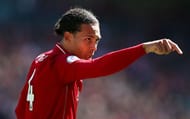
One of the biggest strengths of the Reds in the late 2000s was the rock-solid partnership between local lad Jamie Carragher and Sami Hyypia. The duo formed an impenetrable defensive base, especially under Rafa Benitez. However, the Finn left the club in 2009, and the club's woes at the back began.
Daniel Agger possessed all the qualities required for a modern center-half but his injuries cost him a top career. Martin Skrtel never really grew into a dominant force and Carragher's retirement in 2013 created a huge leadership void at the back.
The likes of Dejan Lovren, Mamadou Sakho and Joel Matip all tried but never succeeded in ticking the box of being a consistent top defender. Enter Klopp's no.1 defensive target Virgil van Dijk. After a long drawn out transfer saga, the Reds finally landed him in January for £75 million, making him the most expensive defender ever. Five months on, the fee is not talked about anymore, which highlights his impact.
The Dutchman possesses strength, height, pace and technical ability. However, what sets him apart is the calmness he instills in the players around him. The 26-year-old is a vocal leader and his nonchalant way of defending sets him a class apart, as seen in the second-half of this season.
In fact, the Reds conceded just 9 league goals since Van Dijk came into the side, a testament to his quality and leadership. Hence, the Merseyside club finally have a top leader at the back and credit goes to Klopp for convincing the player to join them instead of their rivals and then waiting for the move to happen.
#4 The left-back conundrum
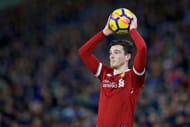
Whenever fans are asked about their favourite left-back this century, they conveniently skip to this decade to land on John Arne Riise or even Fabio Aurelio. It says as much about the subsequent left-back signings as the recruitment team, that the club has seen no fewer than seven players in the past decade trying to solve the problem.
The arrival of Andy Robertson from Hull City for £8 million last summer was met with as much skepticism as one could expect. Initially, it went according to the script as the 24-year-old barely got a chance to play with Alberto Moreno finally finding consistency. However, an injury to the latter changed things.
Robertson was thrust into the first team and as games went on, he began to show why the left-back problem seems to have been solved for the near future. Defensively solid with a wicked delivery from out wide made him the perfect package as the Reds went hunting in Europe. In fact, the full-back has created a clear-cut chance every 243 minutes, which is better than the likes of Cesar Azpilicueta, Kyle Walker, Hector Bellerin and Kieran Trippier.
As Klopp emphasised, the Scot had to get up to speed in terms of the playing style in the initial months. The latter looks to have taken the gaffer's instructions well as indicated by his performances.
Thus, Klopp has definitely filled the huge void in the left-back slot, solving another major problem.
#3 Reina's successor
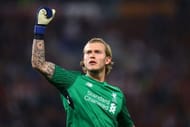
One can observe from the points so far how the failure to replace defensive personnel has been a major problem for the club. Continuing along the lines, Pepe Reina was the last top goalkeeper Liverpool had between the sticks. Several keepers such as Doni, Brad Jones, Peter Gulacsi, Danny Ward and Adam Bogdan were signed without much success in this decade.
Simon Mignolet spent the most time as Liverpool no.1 after Reina's departure. While his form did improve in the previous season, the Belgian does not possess the consistency and leadership required for the role. After a merry-go-round involving Mignolet and Klopp's signing, Loris Karius, the boss finally bestowed the latter with the no.1 role in January for the rest of the season.
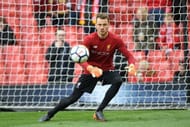
This turned out to be the right move as Karius grew in confidence, and the 24-year-old started to put in the sort of performances which made him finish second behind Bayern Munich's Manuel Neuer for the best goalkeeper in the Bundesliga in 2016. The former Mainz stopper has saved an incredible 42 out of the 58 shots (72.4%) he faced since a 1-0 loss to Swansea back in January. More importantly, 36 of those saves came when the game was still in the balance.
Further, Karius is good with the ball at his feet and his distribution is reminiscent of Reina. Thus, he is expected to be the no.1 going forward and Klopp looks to have solved the goalkeeper puzzle once and for all.
#2 Defensive woes
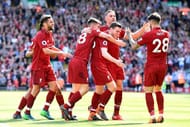
Talking about defensive personnel, it is easy to forget that Liverpool's defensive woes run deeper. While getting in the right players is key to eradicating the problem, it is important for attack-minded teams to defend together as a team to actually solve the issue. Klopp's claims of being a good defensive coach were severely put to the test after a 4-1 mauling at the hands of Tottenham at Wembley back in October.
However, the gaffer started to back his claims as performances improved. As pointed out on Monday Night Football by Jamie Carragher, the average position of Liverpool's full-back Moreno in the next game against Huddersfield at home was surprisingly deeper. The full-backs were no longer playing as wingers and instead, picked their moments to burst forward. This change definitely made the side better at the back while ensuring there was no impact in the goals department.
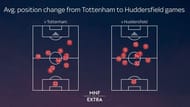
Thus, the team started to work together defensively as the season progressed and the arrival of Van Dijk in January ensured there was a vocal leader at the back. The Dutchman's quality rubbed off on his team-mates, especially Lovren. Karius found form and the midfield shielded their defence better, making the team stronger defensively. This was on display when Liverpool shut out Manchester City spectacularly at Anfield in the first leg of the UEFA Champions League quarterfinals.
In fact, after the Spurs game back in October, the Reds have the best defensive record in the league for the next 29 games, with just 22 goals conceded and Van Dijk has played in only 15 of them. This highlights how Klopp has proven his claims of being a good defensive coach and this progress is here to stay as it is not entirely dependant on a single individual. No wonder Liverpool are the only one among the 92 teams in the English Football League to go unbeaten at home this season, another sign of progress.
#1 Struggles against bottom teams
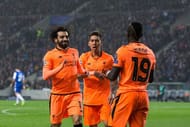
Liverpool's struggles against teams in the bottom half of the table are well-documented. Opposition teams who sit deep and soak in the pressure are one part of the problem as the Reds can no longer get behind their defence like they are accustomed to. The other part of the problem has always been the inability to turn up for such games. Many a time, a Liverpool team got beat by teams in the other half of the table, as the players do not have the same hunger they do whilst playing the top teams.
This has proven to be a major hurdle in sustaining a title challenge over the course of the season, as title winners are expected to beat these teams comfortably. However, Klopp finally looks to have solved the problem.
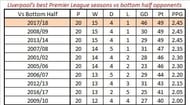
In fact, the Reds have enjoyed their best season against the bottom-half teams in the Premier League era. Klopp's repeated message from the previous seasons finally got to the players, as they stayed patient while they searched for the opening goal.
While the number of draws has to come down for them to have a genuine shot at the title, the changes show that they are sustainable and the team will only get better with more reinforcements coming in this summer. Thus, Klopp has pretty much erased a major problem this season and this bodes well for the immediate future.
Each of the above issues has played a major role in preventing the Reds from becoming a consistent and dominant force in England and Europe. Hence, Klopp deserves great credit for solving them one after the other and a major title push could be on the cards next season.
